15 Best No-Code App Builders in 2025
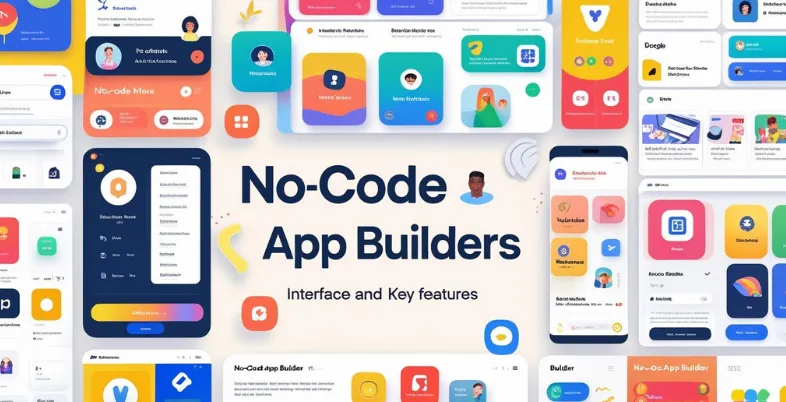
Building an app once required hiring developers, learning programming languages, and investing thousands of dollars. But today, there is no need for all of these, because of no-code platforms. Anyone, even without a technical background, can create professional apps in a fraction of the time and cost.
The no-code market has been growing rapidly, and this shows how quickly businesses and individuals are shifting toward these platforms for launching startups, mobile apps, or even full-fledged enterprise solutions.
In this blog, we’ll explore the best no-code app builders. Each tool will be explained in simple terms with key features, and pros & cons, so you can pick the right one for your needs.
What is a No-Code App Builder?
A no-code app builder is a platform that allows you to build applications without writing any code. Instead of dealing with complicated programming, you use drag-and-drop editors, pre-built templates, and visual workflows.
No-Code vs Low-Code
- No-Code: 100% visual. Designed for non-technical users.
- Low-Code: Some coding knowledge might be required for advanced customization.
Factors to Consider Before Choosing a No-Code App Builder
- Ease of Use: How simple is the drag-and-drop interface?
- Integrations: Does it connect with other tools like Zapier, Google Sheets, or APIs?
- Pricing: Is it affordable for your budget?
- Scalability: Can the app grow as your business grows?
- Support & Community: Is there enough help available when stuck?
List of Best No-Code App Builders
1. Bubble
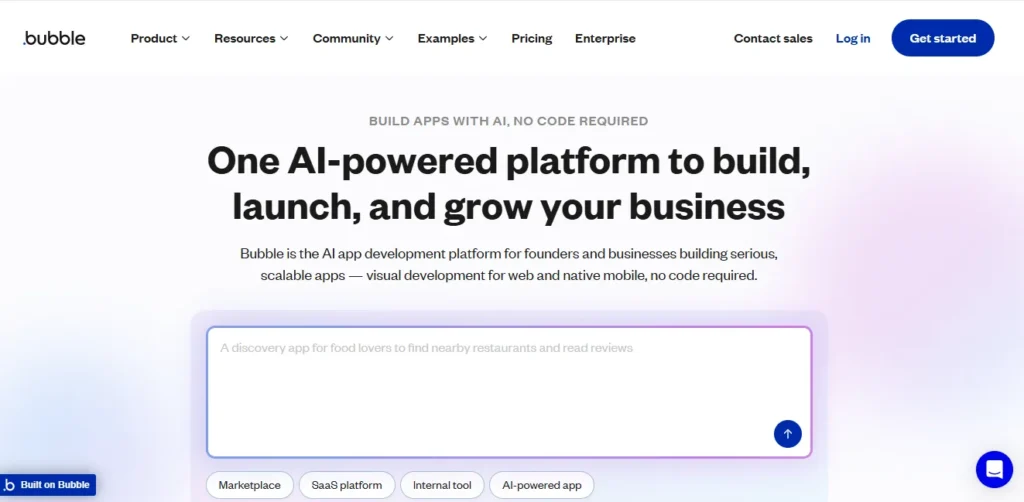
Website: https://bubble.io
Bubble is one of the most recognized names in the no-code world. It allows users to create full-fledged web applications with drag-and-drop functionality while still offering advanced customization options. The platform is particularly popular among startups because it makes it easy to launch an MVP (minimum viable product) quickly without heavy investments in coding.
Bubble also has a large plugin marketplace, so users can add features like payment gateways, chat systems, and integrations with other services. Its responsive design tools ensure apps look good on all devices, making it highly versatile. While beginners may need a little time to understand all of Bubble’s features, its scalability and flexibility make it a go-to option for ambitious projects.
Features:
- Drag-and-drop editor for creating web apps
- Marketplace for plugins and integrations
- Visual workflows for logic building
- Responsive design capabilities
Pros:
- Highly customizable
- Strong community
- Scalable
Cons:
- Steeper learning curve for beginners
2. Adalo
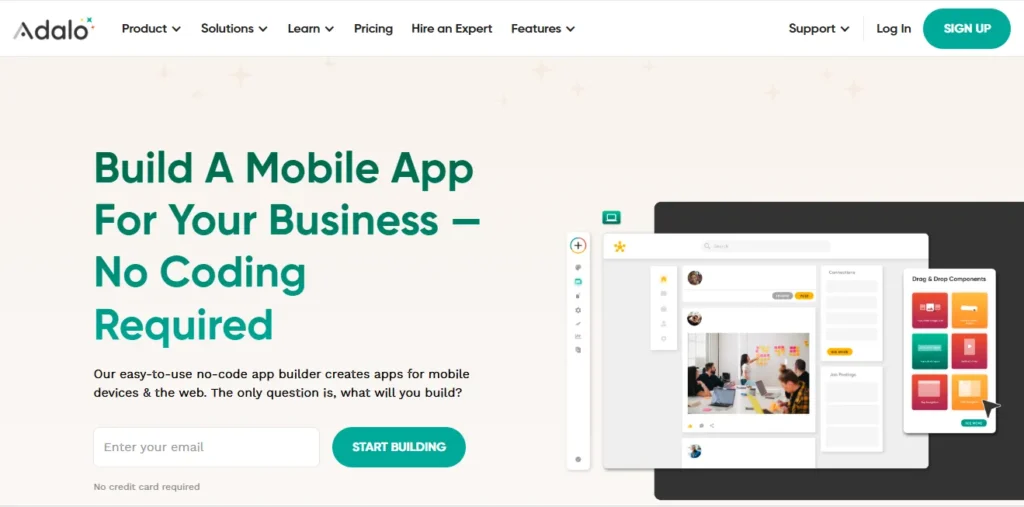
Website: https://www.adalo.com
Adalo is a no-code platform designed for building native mobile apps for both iOS and Android. Its biggest strength lies in its simplicity—users can design mobile app interfaces with drag-and-drop blocks, making the process as easy as designing a presentation slide. Adalo is widely used by small businesses, startups, and creators who want to publish apps to app stores quickly.
You can include features like login systems, databases, and payments without needing to touch a single line of code. The platform also makes it simple to connect apps with external services through APIs, making it more versatile than it looks at first glance. For anyone who wants to create mobile-first solutions, Adalo is one of the most accessible tools available.
Features:
- Native app publishing for iOS and Android
- Pre-built UI components for quick design
- Database and API integration
- Drag-and-drop interface
Pros:
- Mobile-focused
- easy publishing process
Cons:
- Limited for very complex or large-scale apps
Also Read: Best POS System for Small Business
3. Glide
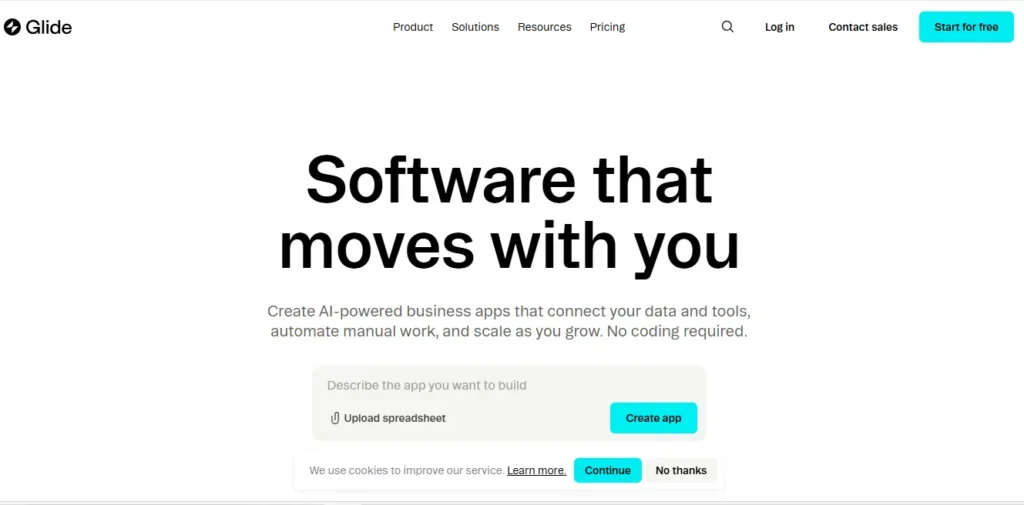
Website: https://www.glideapps.com
Glide is a platform that transforms simple spreadsheets into functional apps. If you are comfortable using Google Sheets or Excel, you already have the skills needed to build with Glide. It is widely used by educators, small businesses, and teams who want lightweight apps for tracking, reporting, or managing data. One of its standout qualities is speed, you can have a working app in just a few minutes.
Glide provides ready-made templates for common use cases, such as employee directories or inventory management. Since changes made in the spreadsheet reflect instantly in the app, it’s excellent for real-time data tracking. While it may not support advanced customization, it’s a perfect fit for anyone who wants fast, functional apps without technical hassle.
Features:
- Build apps directly from Google Sheets or Excel
- Real-time data synchronization
- Simple drag-and-drop builder
- Pre-designed templates
Pros:
- Extremely easy for beginners
- Fast to deploy
Cons:
- Limited customization for advanced apps
4. Webflow
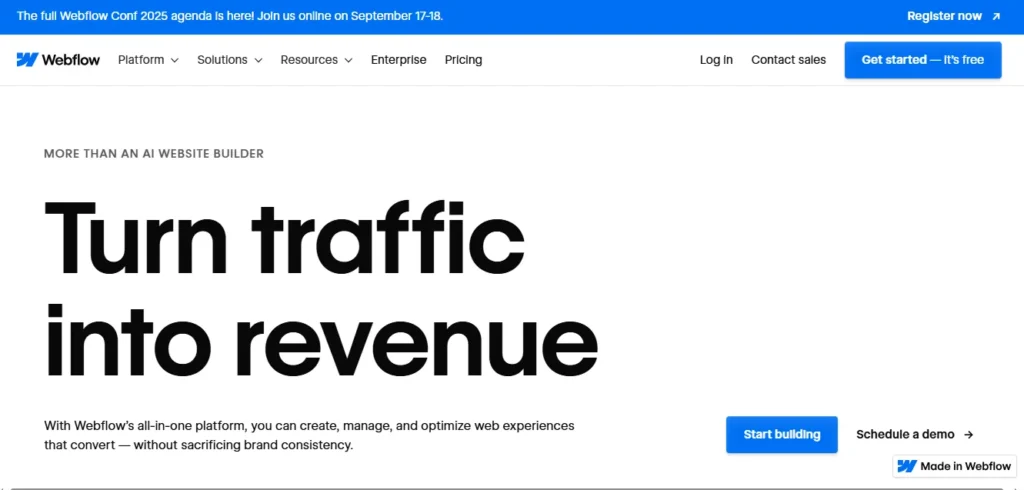
Website: https://webflow.com
Webflow is often considered the designer’s no-code dream tool. It allows you to build websites and web apps that look professional and polished, without relying on pre-made templates like WordPress. Its visual editor is powerful, giving you pixel-level control over layouts, animations, and interactions. Many agencies and freelancers prefer Webflow because it combines design freedom with backend functionality, such as CMS (Content Management System) and e-commerce features.
Another major benefit is its SEO-friendly structure, which ensures that websites built on Webflow perform well in search results. While it may require some time to fully grasp its advanced design options, the results are worth it for those who want visually stunning and functional websites.
Features:
- Professional-grade drag-and-drop design editor
- Built-in CMS for dynamic websites
- E-commerce functionality
- SEO optimization tools
Pros:
- Beautiful
- Professional designs
- Great for designers
Cons:
- Learning curve for complete beginners
5. Thunkable
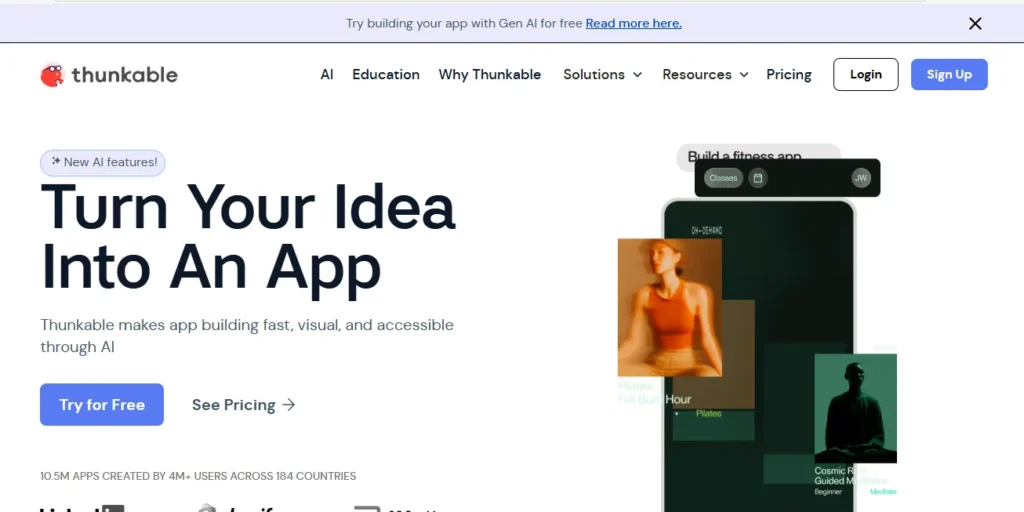
Website: https://thunkable.com
Thunkable is a no-code app builder that focuses on mobile applications. It uses a block-based drag-and-drop system, which makes building apps feel a lot like assembling a puzzle. This simplicity makes it a favorite in education, as students and beginners can create apps while understanding how logic flows. Thunkable supports both iOS and Android, allowing users to publish apps directly to app stores.
The platform also provides access to native device features like GPS, camera, and sensors, making it possible to create apps with real-world utility. Because of its ease of use, it’s a great tool for experimenting with ideas or teaching app development without overwhelming technicalities.
Features:
- Block-based drag-and-drop interface
- Cross-platform support (iOS & Android)
- Access to native device functions
- Cloud storage integration
Pros:
- Beginner-friendly
- Mobile-focused
Cons:
- Limited design flexibility for advanced apps
6. Softr
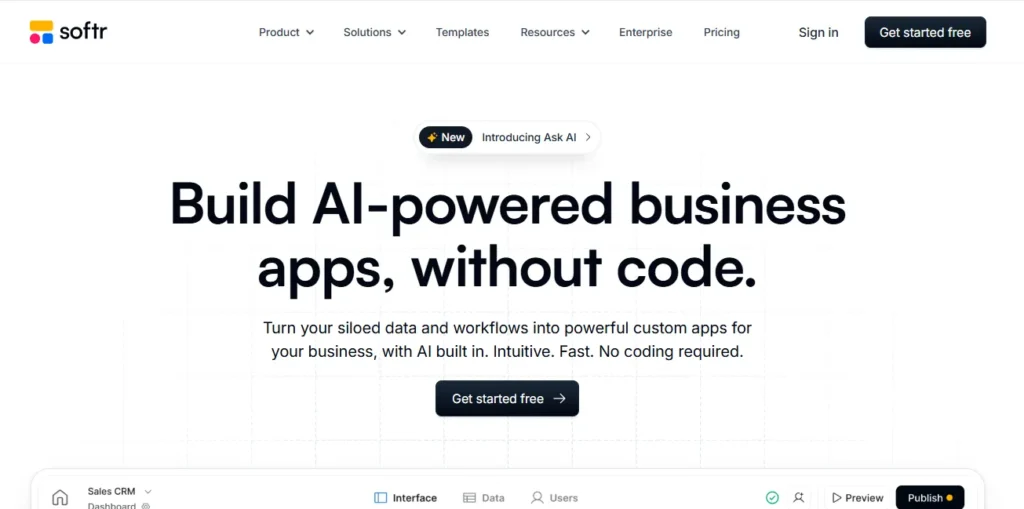
Website: https://www.softr.io
Softr has become a favorite for people who want to build apps and websites directly from Airtable or Google Sheets. Instead of starting from scratch, you simply connect your data and turn it into a professional-looking app. It’s perfect for membership portals, directories, client dashboards, and internal tools. Softr is often praised for its clean pre-built blocks that let you design quickly without worrying about layouts or coding.
Many small businesses, freelancers, and educators use Softr because of its simplicity and versatility. While it may not suit very complex apps, it’s a powerful tool for those who want to transform data into useful applications with minimal effort.
Features:
- Build apps directly from Airtable or Google Sheets
- Ready-to-use blocks for fast design
- User authentication and memberships
- Payment and third-party integrations
Pros:
- Easy to use
- Excellent for data-driven apps
Cons:
- Not ideal for highly customized apps
Suggested Read: Content Management System
7. Zoho Creator
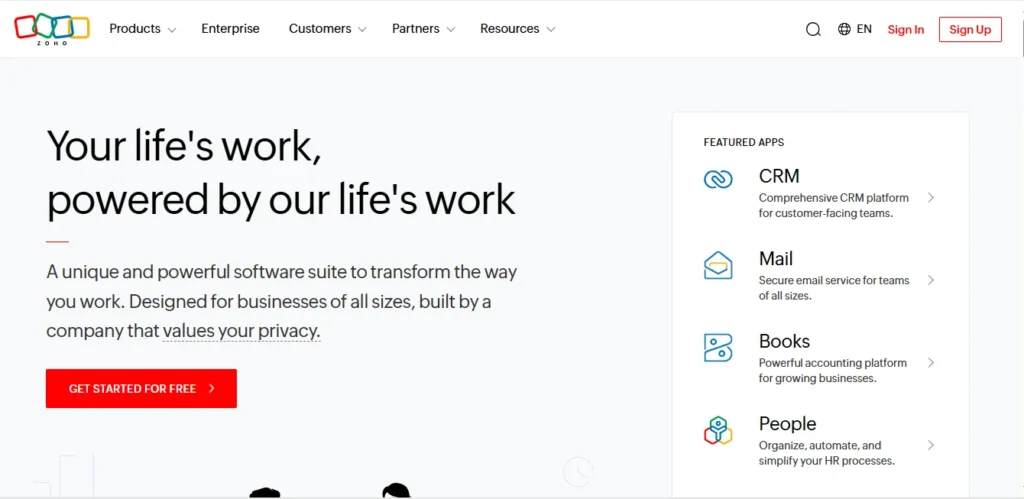
Website: https://www.zoho.com
Zoho Creator is part of the popular Zoho ecosystem and is built for businesses that want powerful no-code solutions. It allows companies to create apps for workflow automation, project tracking, customer management, and much more. With its drag-and-drop editor, even non-technical staff can build custom apps tailored to business needs.
What sets it apart is its focus on enterprise-grade functionality, such as advanced security, data analytics, and integration with other Zoho apps. For organizations already using Zoho CRM, Zoho Creator becomes a natural extension. It may feel a little advanced for solo creators, but for business use, it’s a strong choice.
Features:
- Workflow automation and app building
- Integration with the Zoho ecosystem
- Secure cloud hosting
- Multi-device compatibility
Pros:
- Business-focused
- Reliable
- Highly secure
Cons:
- Can feel overwhelming for beginners
8. Appgyver (SAP Build Apps)
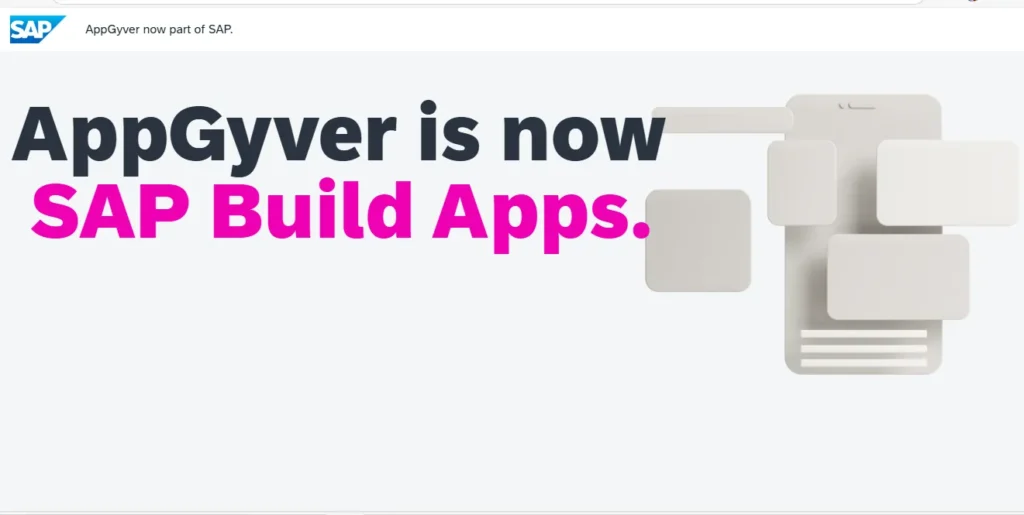
Website: https://www.appgyver.com
Appgyver, now known as SAP Build Apps, is a professional-grade no-code platform for building apps that work across devices. It’s highly regarded in the developer and enterprise community because it combines ease of use with powerful features. The platform supports advanced integrations, APIs, and complex workflows, making it suitable for businesses that need more than just a simple app.
Appgyver offers a broad range of UI components, so users can design apps that look polished and functional. While it may feel more complex than beginner-focused tools, it provides unmatched flexibility for those who need enterprise-level solutions without traditional coding.
Features:
- Visual editor with drag-and-drop components
- Support for complex logic and workflows
- Multi-platform compatibility
- API and database connections
Pros:
- Enterprise-ready
- Powerful customization
Cons:
- Steeper learning curve for non-technical users
9. Draftbit
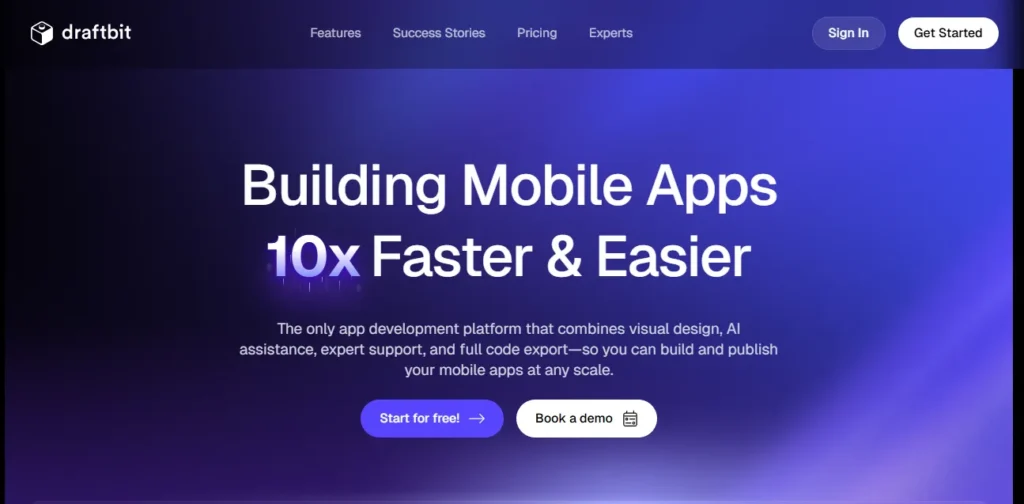
Website: https://draftbit.com
Draftbit is a mobile app builder that gives you both visual design control and access to the underlying code if you want it. Built on React Native, it allows you to visually build apps while still giving flexibility for developers to fine-tune the code. This makes it a favorite among teams that want the speed of no-code but also the freedom of coding when necessary.
Draftbit’s collaborative features allow multiple people to work on an app at once, which is great for startups or design teams. It is especially popular for mobile-first solutions like marketplaces, productivity apps, and community platforms.
Features:
- Drag-and-drop mobile app builder
- Direct access to React Native code
- API and backend integration
- Real-time collaboration for teams
Pros:
- Flexible
- Developer-friendly
- Great for teams
Cons:
- Less suitable for complete beginners
10. OutSystems
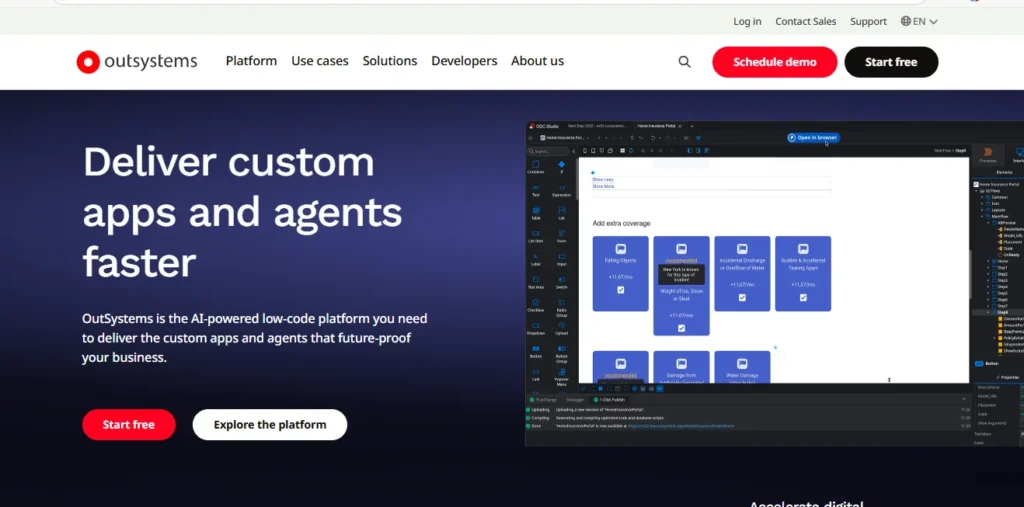
Website: https://www.outsystems.com
OutSystems is considered one of the leaders in the enterprise low-code and no-code market. It’s designed to help large organizations build complex apps faster than traditional development. With strong security, full-stack support, and scalability, it is often used for mission-critical applications in industries like healthcare, finance, and logistics.
OutSystems provides tools for automation, integration, and deployment across platforms, making it a full-service solution. While smaller businesses might find it too advanced, it’s a powerhouse for companies needing robust, scalable apps.
Features:
- Enterprise-grade no-code/low-code builder
- Full-stack app development
- High-level security and compliance features
- Cloud and on-premises deployment
Pros:
- Extremely scalable
- Ideal for enterprises
Cons:
- Not beginner-friendly, complex setup
11. AppSheet (by Google)
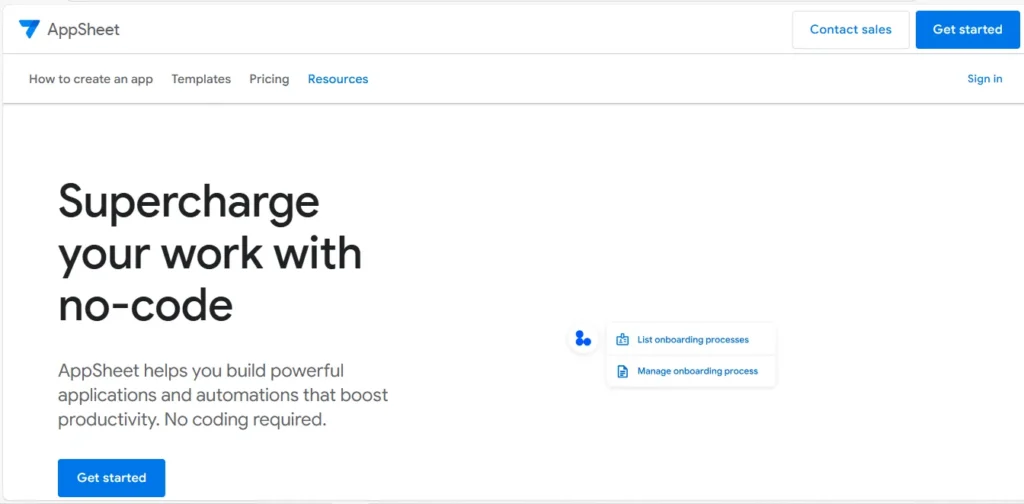
Website: https://www.appsheet.com
AppSheet, part of Google, allows users to turn spreadsheets into powerful apps. It is especially popular among businesses and individuals who already use Google Workspace tools. With AppSheet, you can automate tasks, add AI-driven features, and even use apps offline.
It’s perfect for small businesses, schools, and organizations that want quick solutions for tracking data, managing employees, or improving workflows. Its seamless integration with Google Sheets and other Workspace apps makes it one of the most beginner-friendly tools.
Features:
- Build apps directly from spreadsheets
- AI-driven automation and insights
- Offline app usage
- Integration with Google Workspace
Pros:
- Affordable
- Very easy for Google users
Cons:
- Less design freedom compared to other tools
12. Ninox
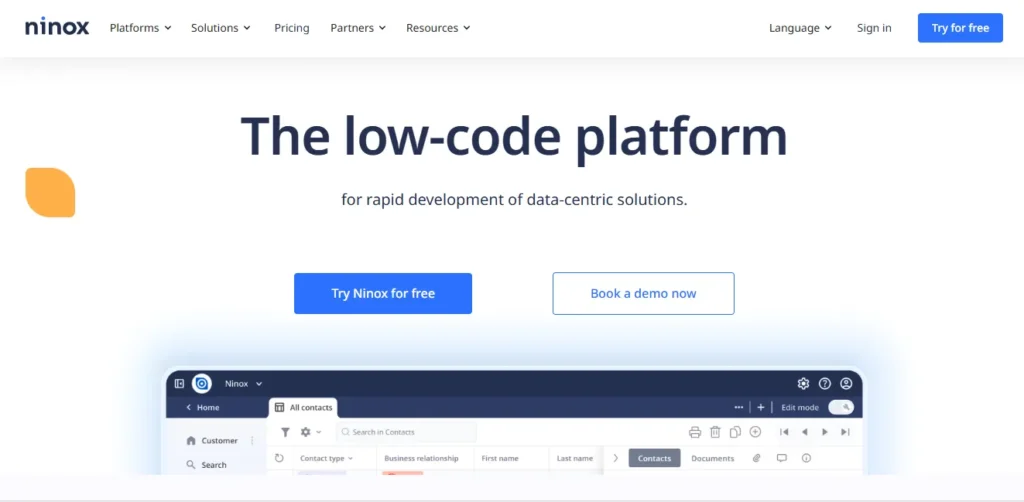
Website: https://ninox.com
Ninox is a no-code platform that focuses heavily on databases and internal business apps. It’s great for companies that rely on data management, reporting, and process automation. With Ninox, you can build apps for inventory, CRM, project tracking, and HR without needing technical skills.
Its drag-and-drop interface allows you to organize data visually while setting up workflows that improve productivity. Ninox is also available on multiple devices, including desktops, tablets, and mobile devices, making it convenient for teams working on the go.
Features:
- Database-driven app builder
- Workflow automation
- Collaboration tools for teams
- Multi-device compatibility
Pros:
- Excellent for data-heavy business apps
Cons:
- Limited creative design options
13. AppMySite
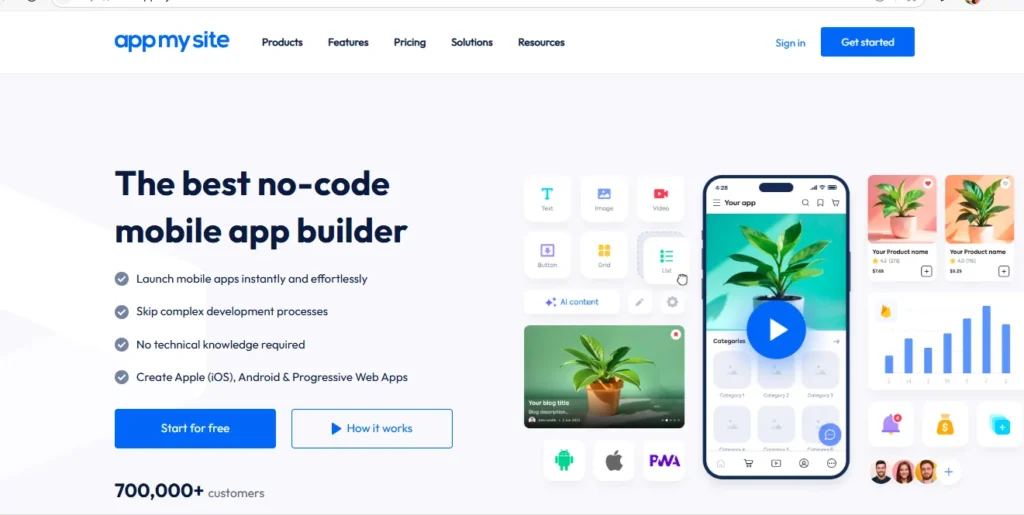
Website: https://www.appmysite.com
AppMySite is designed to help website owners easily convert their websites into mobile apps. It is especially useful for WordPress and WooCommerce users, who can instantly turn their online stores into functional apps.
The platform focuses on simplicity, offering a straightforward app creation process with features like push notifications and customization options. AppMySite is ideal for bloggers, e-commerce stores, and businesses that want to reach mobile users without building apps from scratch.
Features:
- Converts websites into mobile apps
- WordPress and WooCommerce integration
- Push notification support
- Branding and customization features
Pros:
- Quick and easy for website owners
Cons:
- Less flexibility compared to full app builders
14. Betty Blocks
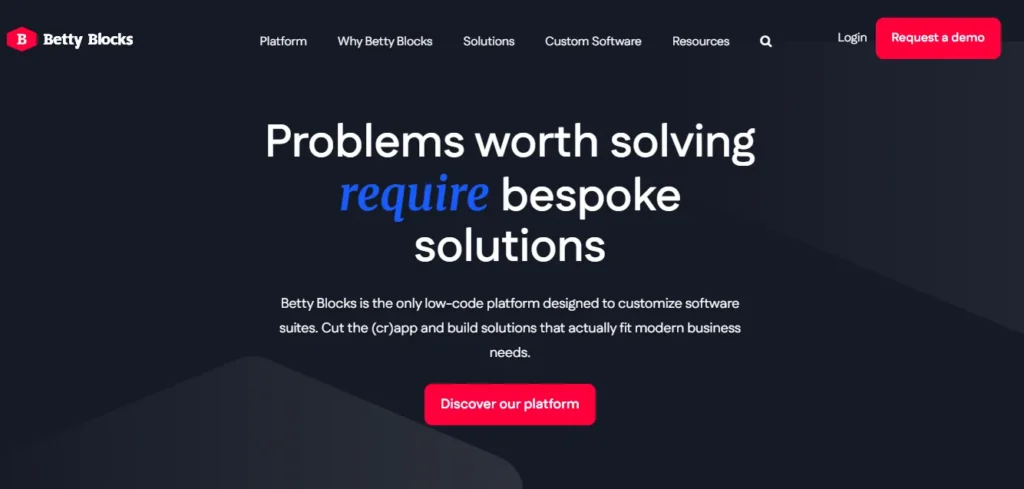
Website: https://www.bettyblocks.com
Betty Blocks is a European-based no-code platform built with enterprises in mind. It enables businesses to develop secure and scalable apps that meet compliance standards. With its intuitive interface, users can build complex workflows and business tools without coding knowledge.
Many organizations choose Betty Blocks for apps that require high levels of security, such as legal or financial services. It’s not as beginner focused as some other platforms, but for enterprises, it delivers both reliability and flexibility.
Features:
- Enterprise-focused no-code development
- Cloud hosting and scalability
- Compliance-ready apps
- Pre-built templates and integrations
Pros:
- Secure, great for large organizations
Cons:
- Too advanced for casual users
15. Quickbase
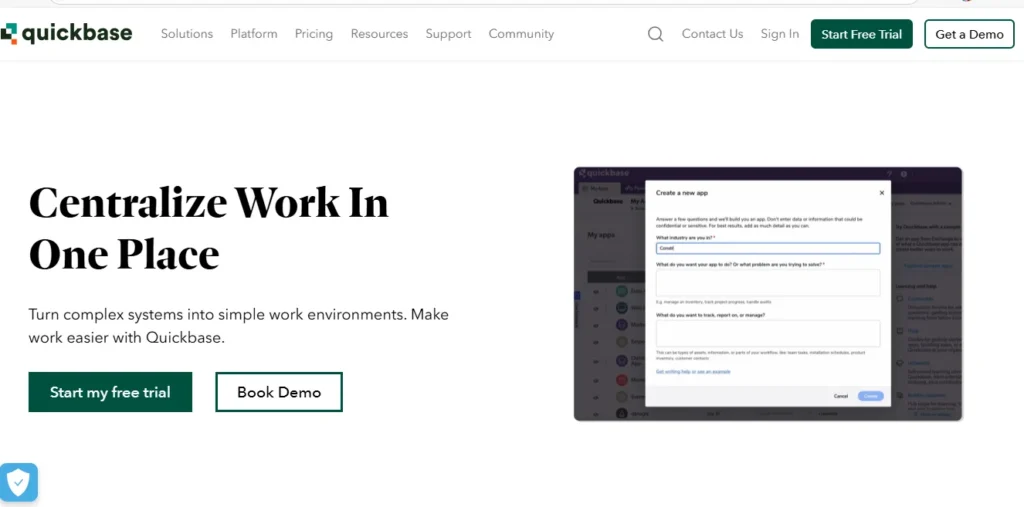
Website: https://www.quickbase.com
Quickbase is a powerful no-code platform built to help organizations streamline processes and improve efficiency. It allows teams to build apps that manage data, automate workflows, and connect with other business tools. Quickbase is widely used for internal apps, project tracking, and supply chain management.
With strong customization features and secure hosting, it is often chosen by enterprises that need dependable solutions without heavy development costs. While its features are geared toward businesses, it is a robust choice for those who want long-term scalability.
Features:
- Workflow automation and process management
- Custom dashboards and reports
- Data-driven app building
- Secure cloud hosting
Pros:
- Reliable
- Scalable
- Perfect for enterprises
Cons:
- Not suitable for personal or hobby apps
Benefits of No-Code App Builders
No-code app builders are changing the way people create apps. Instead of hiring a big team of developers or learning tough coding languages, anyone can now build their own app with easy drag-and-drop tools. Let’s look at the main benefits:
- Faster Development: Apps that usually take months to build can now be created in weeks or even days.
- Cost-Effective: Hiring developers can be very expensive. No-code tools save a lot of money by letting you build apps yourself.
- Accessibility for All: Even if you don’t know coding, you can still create a professional-looking app.
- Easy Customization: You can change designs, add features, or update apps anytime without waiting for a developer.
- Integration Options: Most no-code platforms allow you to connect with popular tools like Google Sheets, PayPal, Stripe, Zapier, and more.
- Quick Testing & Launching: You can build a prototype, test it with users, and launch it quickly in the app store or web.
Limitations of No-Code App Builders
While no-code platforms are very useful, they also come with some limitations:
- Limited Customization: You can build most common apps, but if you need highly advanced features, it might not be possible without coding.
- Scalability Issues: Some platforms may not handle very large apps with millions of users.
- Dependency on the Platform: Your app depends on the tool you are using. If the company changes its pricing or features, it may affect your app.
- Learning Curve: Even though coding is not required, learning how to use the platform still takes time.
- Design Restrictions: Sometimes, design flexibility is limited compared to custom-coded apps.
Conclusion
No-code app builders have opened up endless opportunities for entrepreneurs, small businesses, and individuals. They break the barrier of coding knowledge and allow anyone to turn an idea into a working app. Whether you want to build an e-commerce app, a booking system, a social network, or a simple productivity tool, there is a no-code platform that fits your needs.
While these platforms may not fully replace custom coding for highly complex apps, they are perfect for most startups and businesses looking for speed, cost savings, and ease of use. If you are dreaming of launching your own app but don’t know where to start, a no-code app builder is your best friend.
FAQs
Q1. What is a no-code app builder?
A no-code app builder is a platform that allows you to create apps without writing any code. It uses drag-and-drop features and pre-built templates.
Q2. Are no-code apps reliable?
Yes, most no-code apps are reliable and can handle everyday business needs. However, very large apps may require custom coding.
Q3. Can I publish my app to the App Store and Google Play?
Yes, most no-code platforms let you publish apps directly to the iOS App Store and Google Play Store.
Q4. Do I need technical skills to use a no-code app builder?
No, you don’t need to know coding. But basic computer knowledge and willingness to learn the platform are helpful.
Q5. Are no-code app builders free?
Many platforms offer free plans to get started, but for advanced features or publishing, you may need to upgrade to a paid plan.
 Get 50% off on Vault theme. Limited time offer!
Get 50% off on Vault theme. Limited time offer!